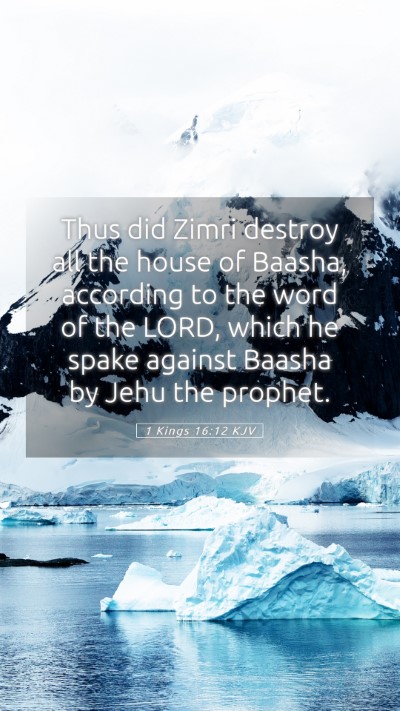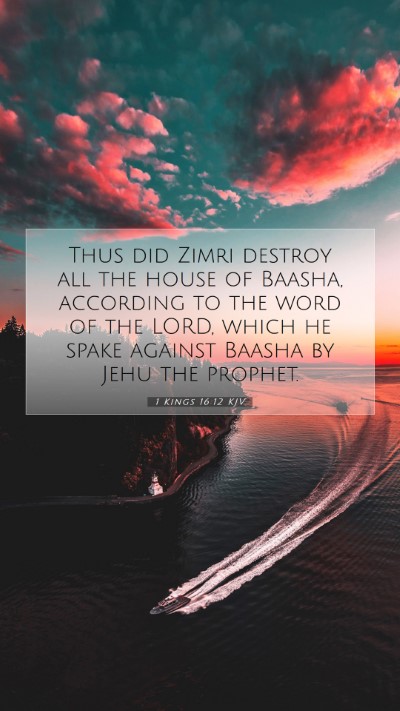Bible Verse Commentary on 1 Kings 16:12
Bible Verse: 1 Kings 16:12 - "And Zimri reigned seven days in Tirzah. And the people were encamped against Gibeathon, which belonged to the Philistines."
Overview
This verse marks a significant moment in the history of Israel during the tumultuous period of the divided kingdom. It highlights the brevity of Zimri's reign and the unstable political climate of Israel at the time.
Summary of Commentary Insights
-
Matthew Henry:
Henry emphasizes the transitory nature of Zimri's reign, suggesting that it underscores the judgment of God upon the house of Baasha, from which Zimri emerged. Zimri's rapid ascension to the throne and subsequent downfall serve as an example of how power can be fleeting and how divine judgment can swiftly enact consequences for rebellion against God.
-
Albert Barnes:
Barnes provides an analysis of the political unrest, indicating that the conflict between competing factions and personal ambitions led to Zimri's quick rise and fall. He points out that the narrative reflects God's sovereignty over Israel's kingship and the ultimate futility of human machinations against divine will.
-
Adam Clarke:
Clarke discusses the historical context, noting that the reference to Gibeathon reveals the military circumstances surrounding Zimri's reign. He stresses the importance of understanding the geographical and political landscape in which these events occurred to fully appreciate the gravity of Zimri's short-lived rule.
Detailed Analysis
This verse, part of a broader narrative, is critical for understanding the nature of leadership in ancient Israel. Zimri's seven-day reign may seem insignificant on the surface; however, it reflects profound theological and moral lessons about governance, fidelity to God, and the consequences of sin.
Historical Context
The context of Zimri's reign is pivotal. Prior to him, Baasha had led Israel into idolatry, and Zimri's rise is a direct result of military and political conspiracies. This tumult is indicative of the instability present in Israel, reflecting a society increasingly at odds with the covenant established between God and His people.
Theological Implications
Matthew Henry notes that Zimri's quick exit from power serves as a reminder of God's judgment. It's a cautionary tale about the transient nature of human authority in contrast to the eternal nature of God’s kingdom. Zimri’s downfall is a significant signal to the people of Israel regarding the importance of aligning with God's will rather than pursuing selfish ambitions.
Application to Daily Life
The story of Zimri serves as an important lesson in humility and the recognition of human limitations. In our modern context, leaders and individuals alike may find reassurance that their positions and authority, much like Zimri's, are susceptible to change. Trusting in God's plan and maintaining fidelity to His principles is vital, especially in tumultuous times.
Interpreter's Guide: Understanding Scripture
For those seeking deeper understanding, it is essential to approach this scripture with the awareness of its historical and cultural backdrops. Engaging with credible Bible study tools and resources can aid in unlocking more profound meanings. Consider joining Bible study groups or utilizing online Bible study courses that focus on Old Testament passages for enhanced insight.
Cross References
- 1 Kings 15:29-30: Highlights Baasha's actions and God's judgment.
- 2 Kings 9:31: Further commentary on the consequences of idolatry and God's judgment.
- 1 Kings 16:16-20: Context for Zimri's rebellion and its repercussions.
Conclusion
1 Kings 16:12 encapsulates a critical moment in Israel's history, offering profound insights for modern readers. By understanding this text through various Bible verse explanations and scholarly commentary, one can appreciate the intricate narratives that shape spiritual learning and applications in today's world.


